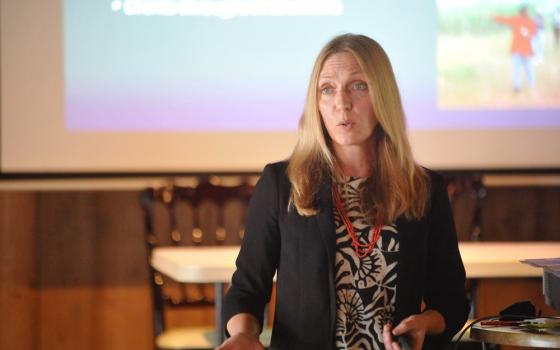
New political circumstances are giving rise to “great hope” for “dramatic and fundamental changes in U.S. nuclear weapons policies,” said Bishop Gabino Zavala of Los Angeles in an address March 11 that marked the start of a new disarmament campaign by Pax Christi USA, the Catholic peace organization.
Zavala, auxiliary bishop of Los Angeles and bishop-president of Pax Christi, also called Catholics to see peacemaking as a “mandatory” vocation and argued that “Catholic social teaching and a vision of Gospel nonviolence can contribute to informing the policy debates and offer guidance for new directions for our nation with regard to war and peace.”
-----------------------------------------------------------------------------------------
Full text of speech by Bishop Gabino Zavala
----------------------------------------------------------------------------------------
In a speech delivered at the University of Great Falls in Great Falls, Mont., Zavala recalled the 1983 pastoral of the U.S. bishops, “The Challenge of Peace,” and subsequent documents based on it as well as the consistent condemnation of war by modern popes.
The pastoral was written during a time of nuclear standoff between the then-Soviet Union and the United States, when Mutually Assured Destruction (MAD) was the mechanism assuring restraint by the superpowers. The bishops then said they tolerated the policy of deterrence only as an interim strategy and “as a step on the way to a progressive disarmament.”
Subsequent documents, recalled Zavala, “specified that ‘progressive disarmament’ must mean a commitment to eliminating nuclear weapons, not simply as an ideal, but as a concrete policy goal.”
The end of the Cold War, however, did not open a path to progressive disarmament. The bishops’ subsequent assessments found that the policy of nuclear deterrence “had been institutionalized” and “had become the very ‘long term basis for peace’ that we rejected in the 1983 pastoral,” Zavala said. “And we found that the role of nuclear weapons had been expanded in the post-Cold War period well beyond the narrow role of deterring the use of nuclear weapons by others to include a whole range of missions including protecting so-called ‘vital interests.’”
Zavala pointed to a speech in May 2005 by the Vatican’s representative at the United Nations, Archbishop Celestino Migliore, as marking a “sea change in Catholic moral teaching on nuclear weapons.”
In the speech, Migliore questioned the morality of nuclear deterrence and said the Vatican acceptance of the strategy was conditioned on it being “only a step on the way toward progressive nuclear disarmament. The Holy See has never countenanced nuclear deterrence as a permanent measure, nor does it today when it is evident that nuclear deterrence drives the development of ever newer nuclear arms, thus preventing genuine nuclear disarmament.”
Citing a meeting last December in Paris in which international political, military and other leaders launched the disarmament initiative “Global Zero” and the often noted joint statement by former secretaries of state Henry Kissinger and George Schultz with former Georgia Sen. Sam Nunn and former secretary of defense William Perry endorsing nuclear abolition, Zavala said “we are in a new moment regarding nuclear disarmament.”
He said he saw hope for such fundamental changes in U.S. policy as ratification of the Comprehensive Test Ban Treaty, “long sought goals of taking deployed nuclear weapons off hair-trigger alert status, negotiating a fissile materials cut-off treaty, and amending the Moscow Treaty to make its proposed cuts in U.S. and Russian nuclear arsenals real and irreversible.” All are possible, he said, “given the new administration and Senate.”
“In the past two decades,” said Zavala, “the social teaching of the Catholic Church has become increasingly pointed in its condemnation of war as a means to resolving conflict. Wars of aggression are understood as intrinsically immoral; and preventive wars waged in anticipation of some future threat are regarded also as particularly immoral.” The bishop was especially critical of the war in Iraq and “claims of success” that ignore the enormous human costs. “Although launched under the guise of the war on terror,” he said, “it served to fan terrorism, as even a CIA report several years back acknowledged, and it provoked the unraveling of an ancient nation.”
He was also critical of President Obama’s intent to send 17,000 more U.S. troops into Afghanistan. “This was done just a few days after he called f or a two-month comprehensive review of U.S. policy in Afghanistan,” Zavala said. “While the situation in Afghanistan is very dangerous and complex, it feels very premature to begin a dramatic deployment of troops before the comprehensive review has barely begun.”
Zavala said it is now up to people of faith “to give voice to alternatives to war, to elevate a prophetic vision of nonviolence, and to work for it – with urgency. … Why not elevate ‘nonviolence’ as a strategy in the political discourse?”
The talk was co-sponsored by the Diocese of Great Falls-Billings. Information on the Pax Christi disarmament campaign can be found at the Pax Christi website. According to the peace organization, the campaign will be aimed at increasing public awareness of the issue and enabling leaders in the Catholic community “to influence the debate and policy formation on U.S. nuclear weapons” as the Obama administration gets underway.
Roberts is NCR Editor at Large.



